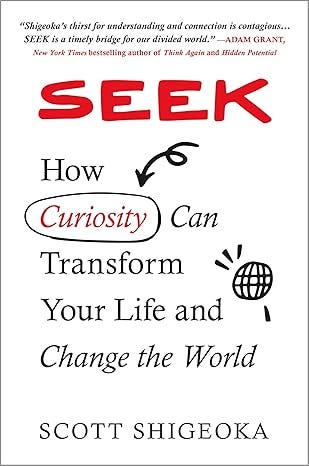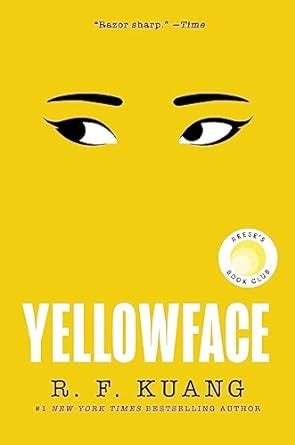Welcome to Mia’s Queue, a free newsletter for “humans in the loop” who care about conscious culture in a tech-driven world. I love exploring how taste and curation facilitate self-discovery and create deeper connections with others. When I’m not exploring what that means in my own life, I chat with an undercover tastemaker infusing creativity and wonder into the world. Learn what lights them up as they tell their inspiration story and share quality things to read, watch, hear, and do. Meet Agent 035: Scott Shigeoka, author of “SEEK.”

While interviewing people for my podcast, The Art of Curation, one word kept coming up: curiosity. Being curious is a superpower with benefits beyond learning. No one knows this better than Scott Shigeoka, who literally wrote the book on curiosity, called “SEEK: How Curiosity Can Transform Your Life and Change the World.” Meeting Scott helped me see that curiosity is the glue between us, and it’s something we can cultivate! That’s terrific news for seekers like you and me.
What does curiosity mean to you?
There are different levels of curiosity, from shallow to deep. Shallow curiosity is more like: How's your day? What do you do for work? Where do you live? Things like that…
The deeper side of curiosity goes beneath the surface through questions that allow you to understand someone’s values and stories. So instead of “What's your name?” you might ask: “What's the story of your name?” Instead of “Where do you live?” it might be: “What does home mean to you?” Instead of “What do you do for a job?” it might be: “When do you feel like you're flourishing?”
It’s about the search for understanding, and it’s a kind of search that leads to connection. And that leads to transformation in some way.
What got you interested in this topic?
I got interested on my road trip across the country in the wake of the 2016 presidential election. I lived out of my Prius and went to places where people “hated me” — a mega church, a Trump rally, a group professing anti-LGBTQ legislation.
What I realized is: I was holding a lot of stereotypes and discriminatory views. When I went to that Trump rally in Minnesota, when I went to that church in Georgia, I learned that there were so many people who were similar to me, who had the same values as me, who did not hate me. Those were just stories that I carried. Through my deep curiosity, I was able to transform my perspective of who “The Other” was.
I've been on the receiving end of that lack of curiosity when people thought they knew everything about me as a queer person, or as someone who's Asian American, but there's so much more to me. No two Asians, no two queers, no two Republicans, no two Christians are the same. There's so much nuance and complexity.
Tell us about the model you’ve developed to help cultivate curiosity.
The D.I.V.E. model is the four-stage methodology I created to help others access deep curiosity. You can think of each letter as one of four muscles that work in tandem with each other to strengthen your capacity to dive into deep curiosity:
Detach - Let go of your ABCs (assumptions, biases, and certainty)
Intend - Prepare your mindset and setting
Value - See the dignity of every person, including yourself
Embrace - Welcome the hard times in your life
We access deep curiosity by exercising these muscles. We don’t have to use them all at the same time; each can be isolated and strengthened through dedicated exercises.
If someone wants to become more curious, what’s the best way to get started?
The best first step to access curiosity is to slow down. This looks like taking deep breaths or going outside for 10 minutes to observe your surroundings. Research shows that these kinds of behaviors can reduce anxiety, increase relaxation, and help you to become more present. By slowing down and being aware of what’s inside or around you, the doors to curiosity open.
You can also do this in conversation. If you’re in a conversation or even a conflict, you can soften the urge to jump right in with a response by taking the time to learn more about someone’s perspective or story by using three simple words: “Tell me more.”
Not only are you able to gain a more nuanced understanding by asking for more, you’re also making that person feel genuinely seen and heard. At the end of the day, what we all want is to feel like our stories and our lives matter to people. When you slow things down, you give your body and mind a chance to enter a mode of curiosity.
Finally, we have to push back on the dominant culture that reveres knowingness and having all the answers. We need to approach problems and relationships with questions and exploration. The research finds that when we showcase this kind of humility and curiosity, people like us more and are more willing to engage with us.
The book came out one year ago, on November 14. Have any of your ideas about curiosity changed since its release?
I've become much more nuanced about the intersection of curiosity and power. I wrote about this topic in the book but have gone so much deeper in the past year and have really felt the resonance from readers. First off: curiosity is earned not deserved. Meaning: you might have curiosities about someone's hair, disability, or whether they're pregnant or not — but that does not mean you're entitled to the information. Curiosity requires trust and a relationship.
The other piece is on predatory curiosity — that sometimes things look like curiosity but they really aren't because there's an agenda or motive underneath it. I was interviewed for this article in The New York Times and it went viral because so many folks have experiences with this.
I'm interested in the books, movies, music, podcasts, etc that had a big impact on your curiosity journey that you would recommend to others.
📙 “Yellowface” by R.F. Kuang
I love fiction, even though I'm a nonfiction writer. I felt so connected to this book, because it's by an Asian-American author, and it's a thriller. It made me realize that whether it's fiction or nonfiction, when you see yourself on the page, it’s like “Oh my gosh, like I feel so seen and heard!” It just makes you feel so good.
🎥 “C.R.A.Z.Y.”
It’s a coming of age for a queer Canadian. I just really resonated with a lot of the family dynamics, the conversations, and the struggles of coming out, and the shame that sometimes you can feel locked into. I just recently watched it with my partner and I was just like, oh my gosh, I feel, again, so seen and represented in this film. There's people who look like me who have a lot more media to draw from that’s not only created by people who look like me but with star protagonists who look like me. I don't think that was the case 30-plus years ago. Honestly, I'm feeling like a warm blanket of love, knowing this kind of entertainment is out. It’s so good for the next generation. And my generation too.
🎶 Dolly Parton and Beyoncé
What I love about both of these artists is that they bring such diverse groups of people together to celebrate the joys of music, dance, and community. It's like a festival. People from all kinds of identities (ages, races, and sexualities) and ideologies (political and beyond). Listening to their music, going to a listening party, or being lucky enough to see them live are all ways to connect to the idea that I wrote about in “SEEK”: that we all share a common humanity. We sometimes lose that when we minimize people into a single label, or judge them based on the groups they're a part of (versus seeing their individuality). But when you're listening to the music of goddesses like these, it's a way of tapping into how we have so much that we share—rather than just focusing on our divisions or differences (although those are powerful and should be celebrated as well!).
You can hear my whole conversation with Scott recorded last year:
Mia’s Queue is a newsletter about and for “humans in the loop.” Each edition is full of culture-forward recommendations hand-picked by authentic people who savor the hunt for the Good Stuff, always strive to be their best, and know that sharing is caring. Thanks for being here!






I love it when we get to discover that two people we deeply appreciate are surprisingly connected! Hi you two! Scott -- It makes me so happy to see how your work continues to provoke and expand, especially now given all that is underway in our country (and beyond). And thank you, Mia, for your own take and focus on this topic.... I needed that reminder around pace and curiosity. ❤️ to you both.
We all need these reminders, especially right now.
Thank you, Scott! Thank you, Mia!